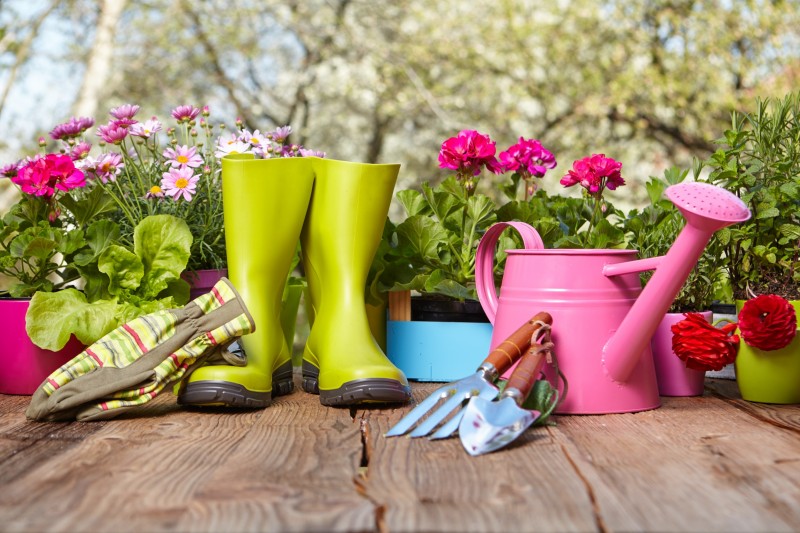
The work of trying to keep your garden looking great this spring and summer starts now.
Even though you may not spend as much time outside during the colder months, there’s still plenty to do so that when the warmer weather finally rolls around, your garden will look its best.
You can make good use of the quieter gardening months to get ahead with your plans because before you know it, the sun will be out, and you’ll be playing catch-up on your garden.
Homeowners in Rugby often overlook the importance of early spring gardening and prep time, but it’s a transitional period that is good for more than just cleaning up and removing debris that has collected or clearing away the leaves that have fallen from nearby trees.
Regular maintenance is important so you don’t have a massive job ahead of you when the temperatures finally start to warm up - particularly if you're getting your property in Rugby ready for viewings.
Top Five Tips to Get Your Garden Ready For Spring and Summer
With this in mind, the team at Horts has put together five tips to keep your Rugby garden looking great this spring and summer.
1. Tidy up debris and borders
Leaves and other debris will naturally fall onto your garden and flowerbeds, so the first step to a beautiful garden is to clear that away. Letting dead leaves sit on top of flowerbeds all winter can cause harm to the root systems of the plants that live underneath the surface because it blocks oxygen and nutrients from reaching the roots.
Even if your plants are dormant, you will want to make sure they’re still healthy enough to grow again when the spring season starts.
It’s also a good idea to clean up your garden borders for a neater look. Cut back any old and dead plant growth, pull any weeds from the root, and trim back overgrown grass.
You can also clear your flowerbeds down to the bare soil so the area is clear for when your deciduous perennials start to regrow.
If your garden is inside a greenhouse, this is the perfect time to give it a good clean. You can remove algae, moss and any other grime from the outside and inside of your greenhouse with a detergent or disinfectant spray so that more light can get inside during the growing months.
It also works well for removing the habitats of plant pests and diseases. Wash and disinfect any unused pots and seed trays as well. Once you’ve fully cleaned your greenhouse, you can inspect the structure to see if there are any repairs needed before the growing season starts again.
Tip: Kerb appeal counts when selling your home. Don't neglect your front garden!
2. Plant summer flowering bulbs
The best time of year to plant your summer bulbs is early spring, so if you want a gorgeous flowering garden come summer, it's time to get to work.
If you aren’t sure which bulbs are good to plant now for summer, you can try tender summer-flowering bulbs, like gladioli, or head to your local garden centre, where they can help you find the perfect addition to your garden.
When buying bulbs, make sure you choose ones that are healthy. If they are damaged (i.e., feel shrivelled or soft), they may not bloom come spring, making all your efforts wasted.
Once you’ve bought your bulbs, don’t let them sit for more than a week, or they will start to sprout. Try and plant them within the week so they have enough dormancy time in the soil.
3. Order your autumn planting bulbs and seeds
If you plan ahead, you can organise your garden better and ensure it looks exactly the way you want it. Spring flowering bulbs such as daffodils, crocus and hyacinths should be planted by the end of September. Make sure you don't miss your timing for next years blooms!
Tip: Missed planting your bulbs at the right time?
It's easy to forget about bulbs and miss the planting season. If this happens, simply get them into the ground or potted up as soon as possible. If you wait and don't plant them until the correct time comes around again, they may have deteriorated and won't flower.
4. Collect rainwater
The winter and early spring seasons are often rainy, so remain environmentally friendly and make the most of any rainfall by collecting it to give to your plants in the spring and summer months. Rainwater is crucial for any gardener who wants an environmentally friendly garden, not to mention it is the best kind of water for your plants. You can collect rainwater by installing a water butt in your garden or simply by leaving out buckets and frequently emptying them into a container to store until it's required.
5. Fix wooden fences and trellis
Early spring is the ideal time to get all those annoying little garden jobs done. Check wooden fences, trellis and gates for damage or rot and fix any broken parts. Use a power washer to remove dirt and grime from fence panels and gates, and your wooden garden furniture, then let the wood dry completely before applying wood preservative, stain, or paint. Do this on a dry day to ensure you get the best coverage.
Need Help Getting Your Garden Ready for a Sale?
It's never too early to think about brightening up your garden, so plan ahead, and you will ensure you can really enjoy your attractive outdoor space.
Are you planning on sprucing up your outdoor space for a potential spring sale? Get in touch with Horts today, either via telephone on 01788 550044 or email rugby@horts.co.uk to book a valuation, and we will help you get everything in order for a quick and easy sale.
Frequently Asked Questions About Getting A Garden Ready For Spring
How can I prepare my flower borders for spring?
When preparing flower borders, cut back old plant growth, remove debris, and pull out weeds. Clear the flowerbeds down to the bare soil, creating a clean canvas for your deciduous perennials to regrow.
When is the best time to plant cold-hardy annuals for a vibrant spring garden?
Cold-hardy annuals can be planted in early spring or late winter, depending on your local climate. These plants, such as pansies and violas, can withstand cooler temperatures and add colour to your garden as they bloom.
How should I care for my garden furniture during the spring and summer months?
To protect your garden furniture from sun, heat and showers, consider covering it with waterproof furniture covers or storing it in a sheltered area. Regular cleaning and maintenance, such as oiling wooden furniture, can help prolong its lifespan.
